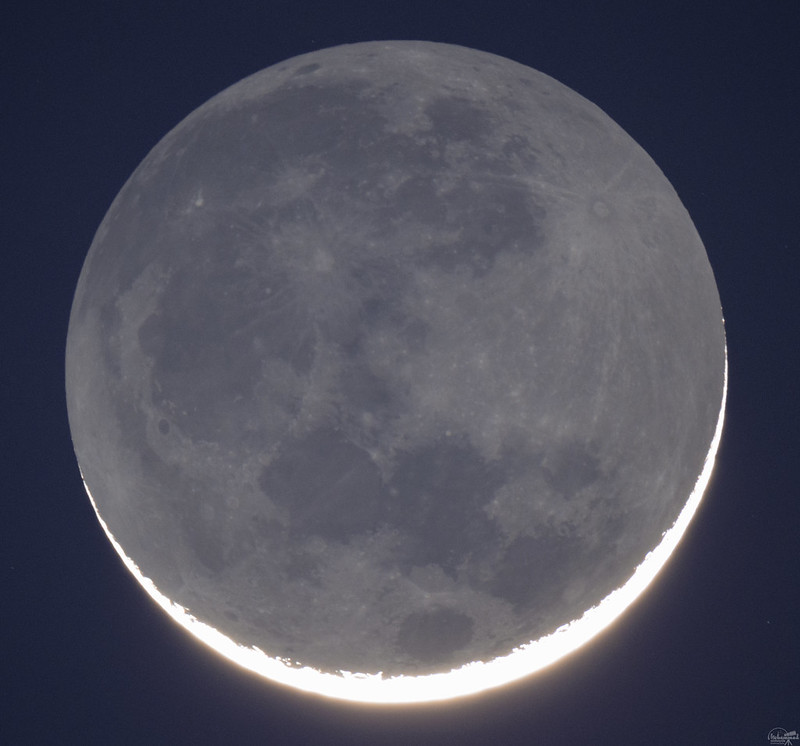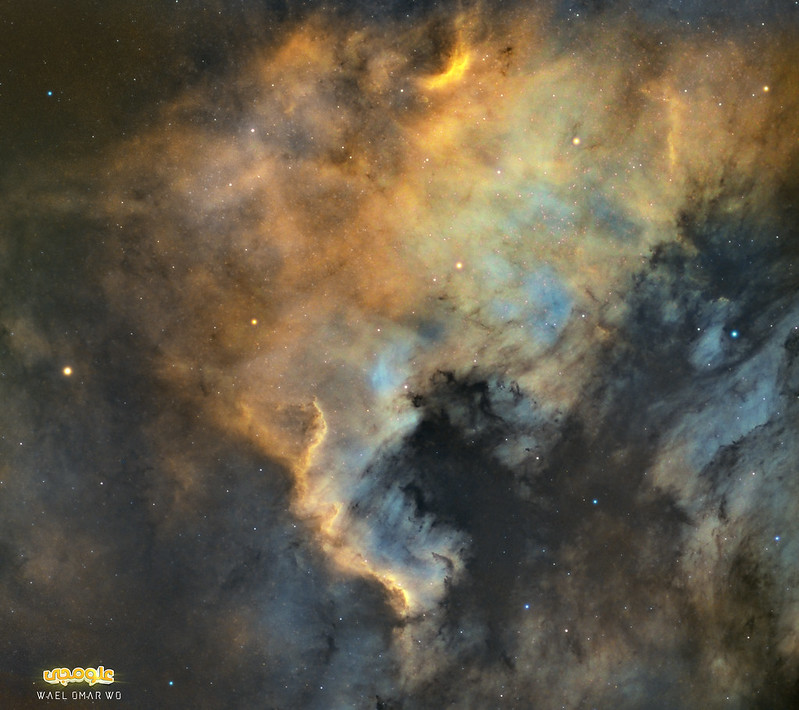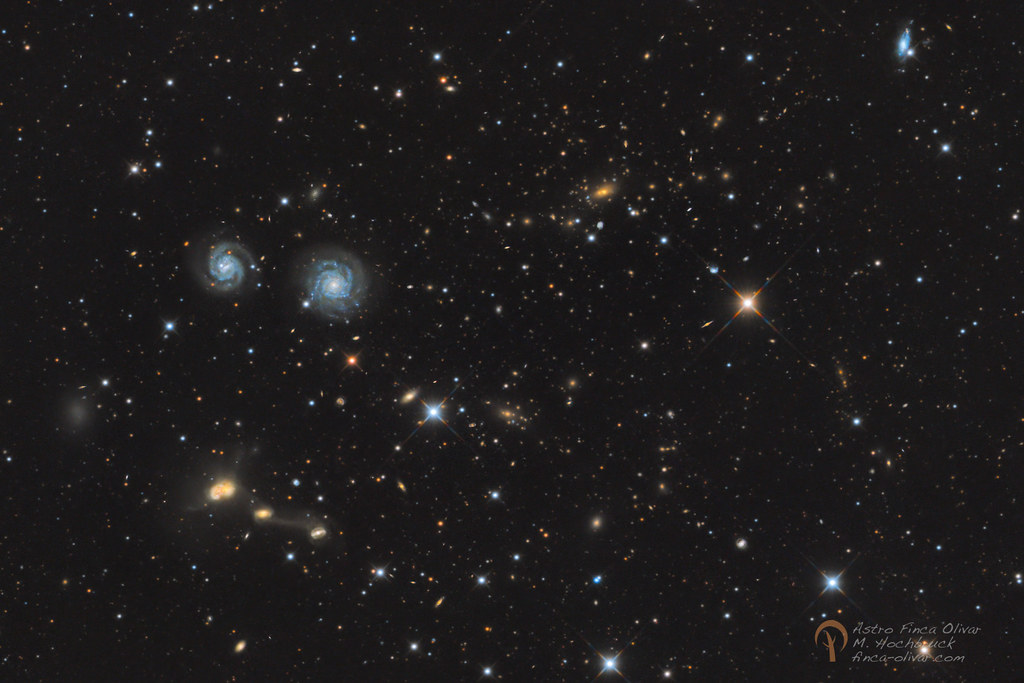Submissions: 2023 April
-
Alson Wong
- Ensign
- Posts: 85
- Joined: Tue Sep 06, 2011 4:14 am
- Contact:
Re: Submissions: 2023 April
Total Solar Eclipse of April 20, 2023
Copyright: Alson Wong
Copyright: Alson Wong
-
prashant_naik
- Ensign
- Posts: 15
- Joined: Thu Nov 07, 2019 2:26 am
Re: Submissions: 2023 April
Heavenly Fireworks: Lyrids Meteor Shower Dances with the Milky Way
URL of website: https://naikonpixels.com/
Copyright: Prashant Naik
POST Processing: 20 images with exposure time 15s at f2.8 and ISO 10000 stacked together and blended in Photoshop.
Location: Sams Knob - Blue Ridge Parkway, North Carolina.
URL of website: https://naikonpixels.com/
Copyright: Prashant Naik
POST Processing: 20 images with exposure time 15s at f2.8 and ISO 10000 stacked together and blended in Photoshop.
Location: Sams Knob - Blue Ridge Parkway, North Carolina.
Re: Submissions: 2023 April
The great Andromeda Galaxy, our nearest galactic neighbor at 2.5million light years away. Like the Milky Way, Andromeda is a Spiral Galaxy. The galaxy is actually visible to the naked eye but looks like a small fuzzy patch in the sky. In the next 4-5 billion years Andromeda and the Milky Way are set to collide and will form a large elliptical galaxy.
Shot on a ZWO ASI 2600MC PRO
Telescope: TS Optics CF APO 90mm F6 Refractor
90x300" exposures - 7.5hrs total integration time
Harley Grady - Nebulosity Media
 M31 - The Andromeda Galaxy by Harley Grady, on Flickr
M31 - The Andromeda Galaxy by Harley Grady, on Flickr
Shot on a ZWO ASI 2600MC PRO
Telescope: TS Optics CF APO 90mm F6 Refractor
90x300" exposures - 7.5hrs total integration time
Harley Grady - Nebulosity Media
 M31 - The Andromeda Galaxy by Harley Grady, on Flickr
M31 - The Andromeda Galaxy by Harley Grady, on FlickrRe: Submissions: 2023 April
 Earthshine by Mohmmad Alobaidi, on Flickr
Earthshine by Mohmmad Alobaidi, on FlickrThis image shows the night of the moon illuminated by the light of the earth in a phenomenon known as the da Vinci effect or the glow of the earth. This image is not a composition or addition, but only one image in a very clear atmosphere through an 8-inch telescope.
You can clearly see the lunar terrain on the dark side of the moon.
Equipment:
Canon Ra
5sec (Single shot)
ISO1250
Celestron 8” HD
Re: Submissions: 2023 April
The Orion Mosaic - 25 Panels
 Orion Mosaic Final APOD by Ahmed Waddah, on Flickr
Orion Mosaic Final APOD by Ahmed Waddah, on Flickr
This is an integration of 25 panels of the Orion constellation region imaged over the last 2 years. I had intended to add some more integration to the outer regions to bring out more details but got involved in other projects that consumed my night sky imaging time. I will complete this project later this year when Orion is back in the sky with enough time. Processing and editing the image must have been the hardest one so far as there are various regions with variant illuminations mainly the Orion Nebula area and other.
Nikon Z6II - Stock
Nikon z6II - Modified
Rokinon 135mm f/2
Sky Guider Pro
Fornax Lightrack II
Sky-Watcher Star Adventurer
IDAS NGS1
Optolong L-Pro
938×180″ - 46h 54′
Full Res https://www.astrobin.com/2qanz4/
Facebook: https://www.facebook.com/waddah.photography
Astrobin: https://www.astrobin.com/users/WolfHeart/
IG: https://www.instagram.com/waddahphotography/
 Orion Mosaic Final APOD by Ahmed Waddah, on Flickr
Orion Mosaic Final APOD by Ahmed Waddah, on FlickrThis is an integration of 25 panels of the Orion constellation region imaged over the last 2 years. I had intended to add some more integration to the outer regions to bring out more details but got involved in other projects that consumed my night sky imaging time. I will complete this project later this year when Orion is back in the sky with enough time. Processing and editing the image must have been the hardest one so far as there are various regions with variant illuminations mainly the Orion Nebula area and other.
Nikon Z6II - Stock
Nikon z6II - Modified
Rokinon 135mm f/2
Sky Guider Pro
Fornax Lightrack II
Sky-Watcher Star Adventurer
IDAS NGS1
Optolong L-Pro
938×180″ - 46h 54′
Full Res https://www.astrobin.com/2qanz4/
Facebook: https://www.facebook.com/waddah.photography
Astrobin: https://www.astrobin.com/users/WolfHeart/
IG: https://www.instagram.com/waddahphotography/
-
Astro Finca Olivar
Re: Submissions: 2023 April
NGC 4410 cluster / LRGB
Copyright: Martin Hochbruck 12h total exposure
Astrobin: https://astrob.in/mxdbtq/0/
Taken in beautiful Astro Finca Olivar - Gaucin / Andalucia
https://finca-olivar-gaucin.com/en/
Copyright: Martin Hochbruck 12h total exposure
Astrobin: https://astrob.in/mxdbtq/0/
Taken in beautiful Astro Finca Olivar - Gaucin / Andalucia
https://finca-olivar-gaucin.com/en/
-
Rafeee
- Ensign
- Posts: 50
- Joined: Fri Feb 24, 2012 8:52 pm
- Location: Hungary, Zselic Starry Sky Park
- Contact:
Re: Submissions: 2023 April
A band of our galaxy
Copyright: Rafael Schmall
https://www.astrobin.com/users/Rafeee/
5 year anniversary!
I finally got my mosaic photo of the Milky Way. The problem was caused by the weather in the northern hemisphere, as well as atmospheric light, which left many gradients behind.
I returned to the picture several times and messed it up several times, but now I feel for weeks that I managed to finish it.
Image Details:
Equipment: Canon EOS1100Dfs, Rokinon 24mm f/1.4, SkyWatcher Star-Adventurer
Exif data: 14x(22x300)sec RGB, ISO800, f4, 24mm ISO érték: 800
Processing: Lightroom, Photoshop
Location: Hungary, Zselic Starry Sky Park / Namibia, Isabis farm
Copyright: Rafael Schmall
https://www.astrobin.com/users/Rafeee/
5 year anniversary!
I finally got my mosaic photo of the Milky Way. The problem was caused by the weather in the northern hemisphere, as well as atmospheric light, which left many gradients behind.
I returned to the picture several times and messed it up several times, but now I feel for weeks that I managed to finish it.
Image Details:
Equipment: Canon EOS1100Dfs, Rokinon 24mm f/1.4, SkyWatcher Star-Adventurer
Exif data: 14x(22x300)sec RGB, ISO800, f4, 24mm ISO érték: 800
Processing: Lightroom, Photoshop
Location: Hungary, Zselic Starry Sky Park / Namibia, Isabis farm
-
ExplorerEGYWO
- Ensign
- Posts: 25
- Joined: Mon Jul 19, 2021 6:40 pm
Re: Submissions: 2023 April
 North America from Cairo by Wael Omar, on Flickr
North America from Cairo by Wael Omar, on FlickrIt was the time to revisit the region of Cygnus , this part of the sky that is full of beauty and cosmic dust.
I point my Redcat 51 scope to NGC 7000 , the North America nebula , that was my first astrophotography target and I neve get bored from reprocessing it.
I collect about 8 hours of Data from Borlte 9 sky. My Neighbors are always amazed why I look up in the sky that has nothing except 2 or 3 stars in this heavy polluted area in Cairo but I told them I could see more stars and interstellar objects through my scope and camera
Equipment used:
Camera: ASI 294 mm pro.
Camera : Redcat 51.
Date and Time :
28 April 2023..
Settings :
Antila Ha 3nm : 11 * 600 seconds – 11* 300 seconds , Gain 120
Optolong OIII 6.5 nm: 8*600 seconds - 15*300 seconds Gain 120.
Antila SII 3nm : 13 * 600 seconds – 8 * 300 seconds Gain 120
Images were stacked and processed in Pixinsight - photoshop ,processed in SHO Hubble palette.
Location : Cairo,EGYPT.
Credit: Wael Omar WO /https://www.instagram.com/waelomar_astrophotography/
-
a.carrozzi
- Ensign
- Posts: 56
- Joined: Tue Aug 25, 2015 9:58 am
Re: Submissions: 2023 April
The spiral galaxy M83 is located “only” twelve million light-years away in the southern constellation of Hydra. The spiral arms give this galaxy the name Southern Pinwheel. The reddish regions of star formation that dot them, highlighted in this image by the addition of the "narrow-band" hydrogen signal that constitutes them, also suggest another nickname, the Thousand Rubies Galaxy.
The image is the result of about 5h of exposure acquired in multiple sessions remotely from Australia during March 2023.
Technical data: RCOS 12.5" by Star Instruments with Apogee Alta U16. Astrodon series II LRGB and Ha 5nm filters.
 M83 - The Southern Pinwheel Galaxy by Alessandro Carrozzi, su Flickr
M83 - The Southern Pinwheel Galaxy by Alessandro Carrozzi, su Flickr
The image is the result of about 5h of exposure acquired in multiple sessions remotely from Australia during March 2023.
Technical data: RCOS 12.5" by Star Instruments with Apogee Alta U16. Astrodon series II LRGB and Ha 5nm filters.
 M83 - The Southern Pinwheel Galaxy by Alessandro Carrozzi, su Flickr
M83 - The Southern Pinwheel Galaxy by Alessandro Carrozzi, su FlickrRe: Submissions: 2023 April
IC 2631 shrouded in dust
Copyright: Ethan Wong
Gallery: https://www.instagram.com/deepspaceproject_/ Full Resolution here: https://flic.kr/p/2oxg64E
IC 2631 is a fascinating deep sky object located in the southern constellation of Chameleon. This object is a reflection nebula, which means that it shines not by emitting light, but by reflecting the light of nearby stars.
The nebula is illuminated by a young, hot star located in its center, which is responsible for the blue tint of the nebula. This star is a member of a small cluster of stars known as Collinder 135, which is also located within the nebula. The cluster contains around 10 stars, but only a few are visible in most amateur telescopes.
The nebula is approximately 600 light-years away from Earth and spans about 10 light-years across. It is surrounded by a complex network of dark dust clouds, which create intricate patterns and shapes when viewed through a telescope. The dust clouds also block the light from distant stars, creating a dark lane that runs through the center of the nebula.
Overall, IC 2631 is a beautiful and intriguing deep sky object that is worth observing or photographing for anyone interested in astrophotography or amateur astronomy. Its striking appearance and location in the southern skies make it a popular target among stargazers in the southern hemisphere.
Imaging Details:
Imaged under Bortle 1 skies
Zwo ASI 2600MM
Antlia LRGB V-Pro filter
2 hours Lum
1 hour (total) of Red, Green and Blue data
Copyright: Ethan Wong
Gallery: https://www.instagram.com/deepspaceproject_/ Full Resolution here: https://flic.kr/p/2oxg64E
IC 2631 is a fascinating deep sky object located in the southern constellation of Chameleon. This object is a reflection nebula, which means that it shines not by emitting light, but by reflecting the light of nearby stars.
The nebula is illuminated by a young, hot star located in its center, which is responsible for the blue tint of the nebula. This star is a member of a small cluster of stars known as Collinder 135, which is also located within the nebula. The cluster contains around 10 stars, but only a few are visible in most amateur telescopes.
The nebula is approximately 600 light-years away from Earth and spans about 10 light-years across. It is surrounded by a complex network of dark dust clouds, which create intricate patterns and shapes when viewed through a telescope. The dust clouds also block the light from distant stars, creating a dark lane that runs through the center of the nebula.
Overall, IC 2631 is a beautiful and intriguing deep sky object that is worth observing or photographing for anyone interested in astrophotography or amateur astronomy. Its striking appearance and location in the southern skies make it a popular target among stargazers in the southern hemisphere.
Imaging Details:
Imaged under Bortle 1 skies
Zwo ASI 2600MM
Antlia LRGB V-Pro filter
2 hours Lum
1 hour (total) of Red, Green and Blue data
" If people looked up to the skies at night, they'd live differently. "
https://deep-space-project.com
https://deep-space-project.com
- Vitopastorini
- Asternaut
- Posts: 4
- Joined: Wed Apr 05, 2023 11:22 pm
- AKA: Rodrigo Pastor Pensa
- Location: Temuco, Chile
- Contact:
Re: Submissions: 2023 April
Thanks so much AnnAnn wrote: ↑Mon Apr 24, 2023 6:53 amHello and welcome to Starship Asterisk*! That's a very fine image that you posted. I particularly appreciate the annotated version, because at first I couldn't make head or tails of your image. That's because the constellations are "upside down" from a northerner's point of view! Of course there is no "up" or "down" in space, so I reacted from my personal bias. Anyway, your annotated image is so helpful, and it is impressive that you managed to cram four planets into one picture and show us the Moon/Pleiades conjunction as well!Vitopastorini wrote: ↑Mon Apr 10, 2023 5:10 am hi! this is my very first post in the Forum, hope you like it.
Story:
This picture was taken on march 25, 2023 at 21:15 from the slopes of Llaima volcano (Conguillío National Park) in Araucanía region in Chile. We can see the moon and pleiades conjunction, Venus, Urano, Mars and Orion among others.
In the foreground we can see some araucaria trees, commonly called the monkey puzzle tree, monkey tail tree, piñonero, pewen or Chilean pine, which is an evergreen tree native to central and southern Chile and western Argentina, in fact the distribution is bouded between the 37th parallel south and 40th parallel south, mostly in the chilean part of the Andes. Because of the prevalence of similar species in ancient prehistory, it is sometimes called a living fossil; individuals can achieve ages beyond 1,000 years. In this park was filmed the BBC documentary "Walking with Dinosaurs" (1999) for it resemblance to prehistoric landscapes of volcanoes, lagoons and araucaria trees. More recently it was part of the 2022 Netflix documentary "Our Great National Parks" (Episode 2: Chilean Patagonia), presented by former president of the United States Barack Obama.
Exif:
Nikon D850
Tamron SP 15-30 f2.8 at 15mm
0.8 sec f/2.8 ISO 1600
Copyright: Rodrigo Pastor Pensa
ig: @vitopastorini
Ann
